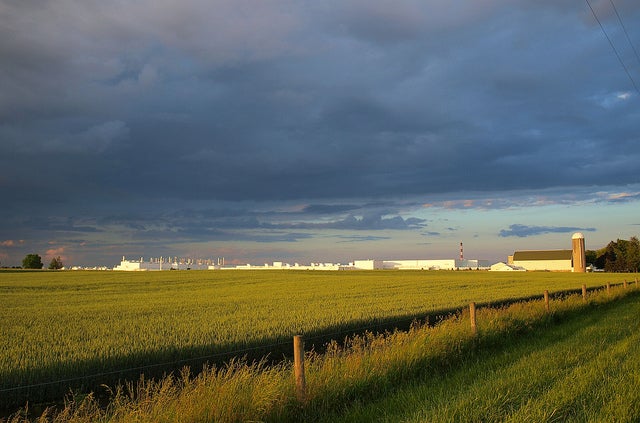 The way we produce food is getting a lot of attention these days, and for good reason. If current projections hold, we’ll have 9 billion mouths to feed by 2050 – 2 billion more than we have today.
The way we produce food is getting a lot of attention these days, and for good reason. If current projections hold, we’ll have 9 billion mouths to feed by 2050 – 2 billion more than we have today.
Throughout history, when we’ve needed to expand food production, we’ve gone to nature’s vast storehouse and made withdrawals. In doing so, we’ve filled wetlands, dried up rivers, degraded habitat, and polluted our air and water.
We’ve already drawn down nature’s account to dangerously low levels, and we still need to produce more.
If we’re going to meet growing needs for food and water, we’re going to have to do it in ways that not only stop harming the environment, but actually improve the ecosystems that serve us. Business as usual just isn’t going to cut it.
Farmers lead the way
During the past decade, we’ve been in quiet conversations with farmers and ranchers about how to facilitate this transformation. As we’ve walked their land, we’ve seen some encouraging things.
- Ranchers in Texas demonstrated that it can be profitable to raise cattle alongside endangered species like the golden cheeked warbler.
- Farmers throughout the Midwest are teaching us that it is possible, and profitable, to reduce fertilizer pollution while maintaining or increasing yields.
- In California, we’re learning from growers like Woolf Farming and Processing how to optimize irrigation efficiency to reduce water use and increase profit margins. If you spread ketchup on your burger, chances are you’ve tasted Woolf”s tomatoes. The family processes 20,000 acres of them in the state’s drought-stricken Central Valley, where maximizing irrigation efficiency isn’t auxiliary – it’s necessary.
A common thread running through these efforts is that they build up nature’s bank account by eliminating unnecessary withdrawals and making strategic deposits.
Rethinking business as usual

If we can scale these practices up and make them business as usual, it will go a long way toward increasing the resilience of the natural systems that sustain us.
Of course, these practices alone won’t solve the bigger challenge of closing the projected gap between food supply and demand in ways that build up nature’s bank account. When it comes to meeting the great food challenge of this century, there is no silver bullet. In addition to using agricultural resources more efficiently, we’ll need to think about food waste, genetics, distribution, diets and more. That looks to us like silver buckshot.
My colleagues and I will be using this blog to discuss how we can feed the world without destroying the planet. Our hope is that by sharing our ideas and experiences – and those of our ag partners – we can develop solutions together that benefit people and the ecosystems on which we all depend. After all, food security and the security of our natural environment are one in the same.










One Comment
Thank you for writing about this important issue! I hope this blog will examine the inefficiency of animal agriculture and how switching to a plant-based diet can help feed the world without destroying the planet.
According to the United Nations Food and Agriculture Organization’s report, “Livestock’s Long Shadow,” cattle-rearing generates more global warming greenhouse gases, as measured in CO2 equivalent, than transportation. Livestock now use 30 per cent of the earth’s entire land surface, mostly permanent pasture but also including 33 per cent of the global arable land used to producing feed for livestock. Also, the livestock sector may well be the leading player in the reduction of biodiversity, since it is the major driver of deforestation, as well as one of the leading drivers of land degradation, pollution, climate change, overfishing, sedimentation of coastal areas and facilitation of invasions by alien species.
In the report’s conclusion, the UNFAO says that the trend toward vegetarianism is a cause for optimism. And because of the inefficiency of raising animals for eggs or dairy, veganism is an even better solution.